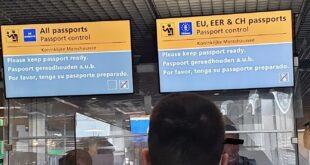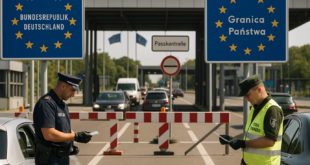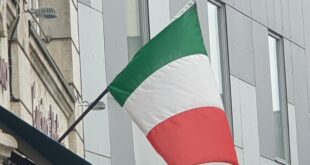Under the theme Restorative Justice after Genocide, the German NGO community meets descendants of the victims of the Ovaherero and Nama genocides 1904-1908 from all over the world on 14-16 October in Berlin.
The conference is organised by Berlin Postkolonial in cooperation with AfricAvenir International, the Ovaherero/Ovambanderu Genocide Foundation (OGF), the Nama Technical Committee on Genocide, the Association of the Ovaherero/Ovambanderu Genocide in the USA (OGA), the OvaHerero/Mbanderu and Nama Genocides Institute (ONGI), and the German NGO Alliance “No Amnesty on Genocide!”
According to the organisers, the main goals of the congress are:
► to reflect on the past struggle for restorative justice for the Ovaherero and Nama genocides.
► to evaluate recent developments and the present situation in Germany and Namibia with regard to the exclusion of Ovaherero and Nama from the genocide negotiations.
► to affirm the right of the Ovaherero and Nama communities to be directly involved in negotiating a comprehensive solution, including recognition of the genocides, a sincere apology and just reparations for the genocides.
► to chart a course for transnational actions to secure restorative justice and the repatriation of all Ovaherero and Nama human remains shipped to Germany.
The Armenia genocide vote by the German parliament (Bundestag) voted, in June, has reignited the debate over the killing of at least 65,000 OvaHerero and 10,000 Nama people by German colonial troops between 1904 and 1908 in what is now Namibia. The African peoples had rebelled against the confiscation of their land and cattle by the colonising Germans. Some historians say it was the first genocide of the 20th century.
During the diplomatic war of words that followed the Bundestag vote, Turkish President Recep Tayyip Erdogan reminded Germans of their Namibian sins as he criticised the resolution against his country.
Germany has, however, not officially recognised the tragic event as genocide even though it has expressed its regrets over the killings.
There are signs that Berlin might be changing its position. Daily newspaper Frankfurter Rundschau reported on 12 June that for the first time, the German government had referred to the massacre at the turn of the 20th century as genocide in an official document. However, the German government has yet to publicly change its assessment of the atrocities and declare them formally as genocide.
Meanwhile, both the Namibian and German governments have appointed special envoys for negotiations on the genocide. However, the leaders of the affected OvaHerero and Nama communities accuse their government of sidelining them in the negotiations. Their position has been supported by German opposition parties, the Greens and The Left.
Windhoek maintains that it is acting on behalf of the Namibian people, and that ethnic groups other than the OvaHerero and Nama were also victims of the genocide. The government insists that the victim communities were outside the confines of the negotiations save for peripheral consultations.
The OvaHerero and Nama communities reject government-to-government negotiations, insisting on being the main negotiating partners of the Germans with their government playing the role of a mediator. A demand rejected by both Berlin and Windhoek.
In February, the victim communities issued an ultimatum to Berlin, which expired on 1 May, to enter into direct talks with them; it was the second time they have issued such an ultimatum. The German government, which has consistently maintained that it would negotiate only with the Namibian government, has refused to change its position.
On 17 May, Bob Kandetu, spokesperson for the OvaHerero Traditional Authority, stated in Windhoek that leaders of the victim communities have, after long contemplation, resolved to take the bull by the horns. He issued a statement where he announced the intention of the communities to take Germany to the International Tribunal at The Hague.
“Germany must now face the real prospect of a long, drawn-out arbitration proceeding at the international level, with the potential of being declared an international pariah state, guilty of war crimes and crimes against humanity,” the statement said. // Sola Jolaoso
ATTENDANCE INFORMATION
Restorative Justice after Genocide – Non-Governmental Congress on the Ovaherero and Nama Genocides, 1904-08
Dates and Time:
The congress will begin on Friday, October 14 at 2:00 pm and conclude on Sunday, October 16, at 1:00 pm. It will conclude with a march through Berlin on Sunday morning.
Venue/Hotel:
The congress will be held at the Centre Francais, 13349 Berlin, Germany, Müllerstraße 74. The associated Hotel de France promised to offer single & double rooms for Oct 14 & 15 at a congress rate: www.hotel-francais-berlin.de, phone: +49(0)30 417 29 0.
Exhibition:
Autumn 2016 there will be a major exhibition on German colonialism in Berlin. The opening event will be in the evening of 13 October: www.dhm.de/en/ausstellungen/preview/german-colonialism.html
 THE AFRICAN COURIER. Reporting Africa and its Diaspora! The African Courier is an international magazine published in Germany to report on Africa and the Diaspora African experience. The first issue of the bimonthly magazine appeared on the newsstands on 15 February 1998. The African Courier is a communication forum for European-African political, economic and cultural exchanges, and a voice for Africa in Europe.
THE AFRICAN COURIER. Reporting Africa and its Diaspora! The African Courier is an international magazine published in Germany to report on Africa and the Diaspora African experience. The first issue of the bimonthly magazine appeared on the newsstands on 15 February 1998. The African Courier is a communication forum for European-African political, economic and cultural exchanges, and a voice for Africa in Europe.
































